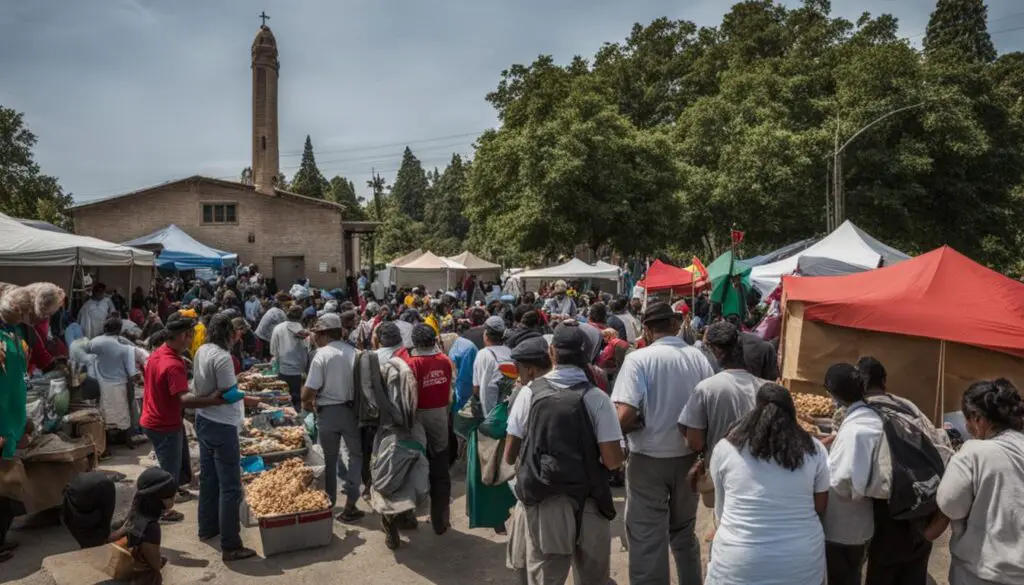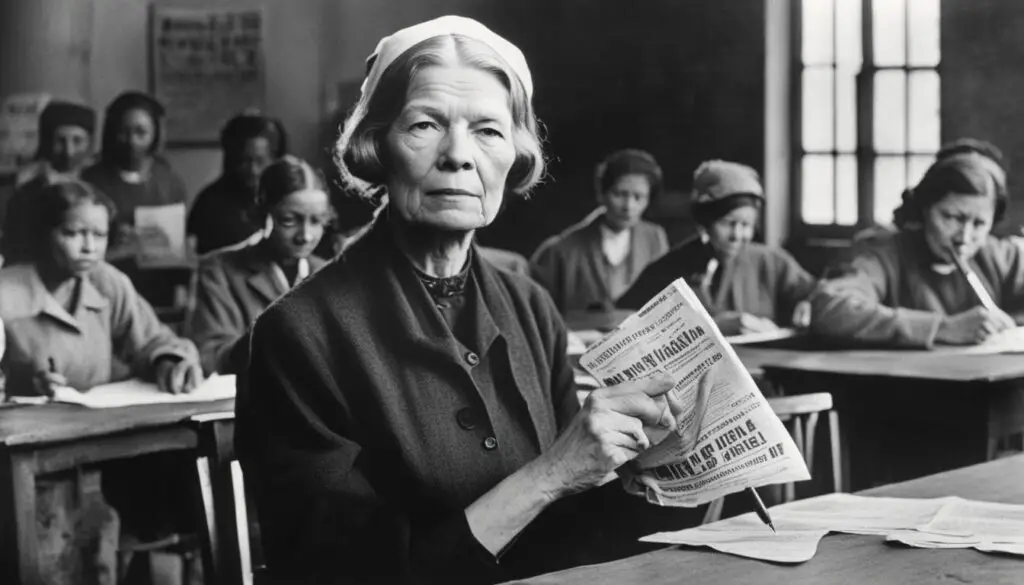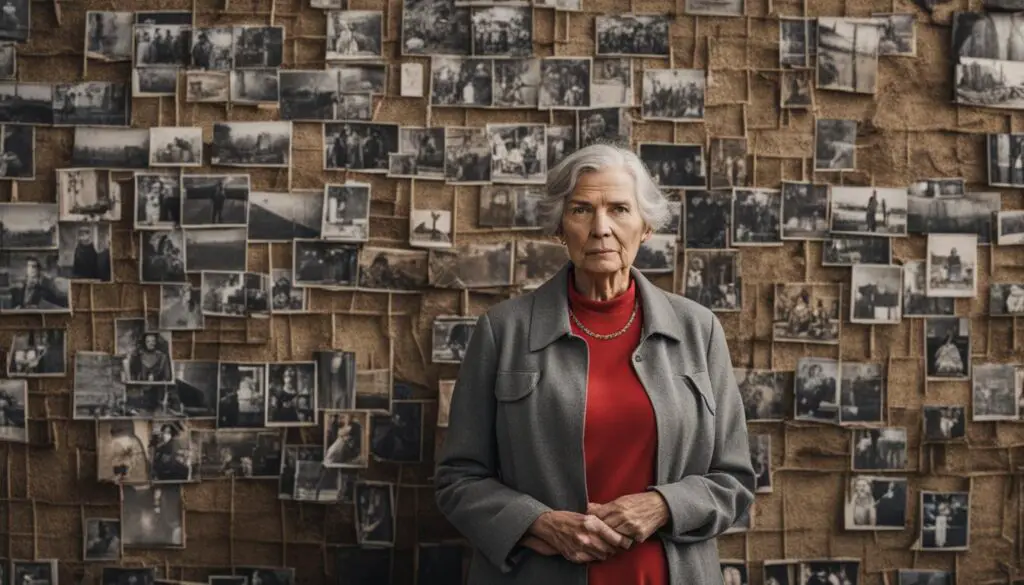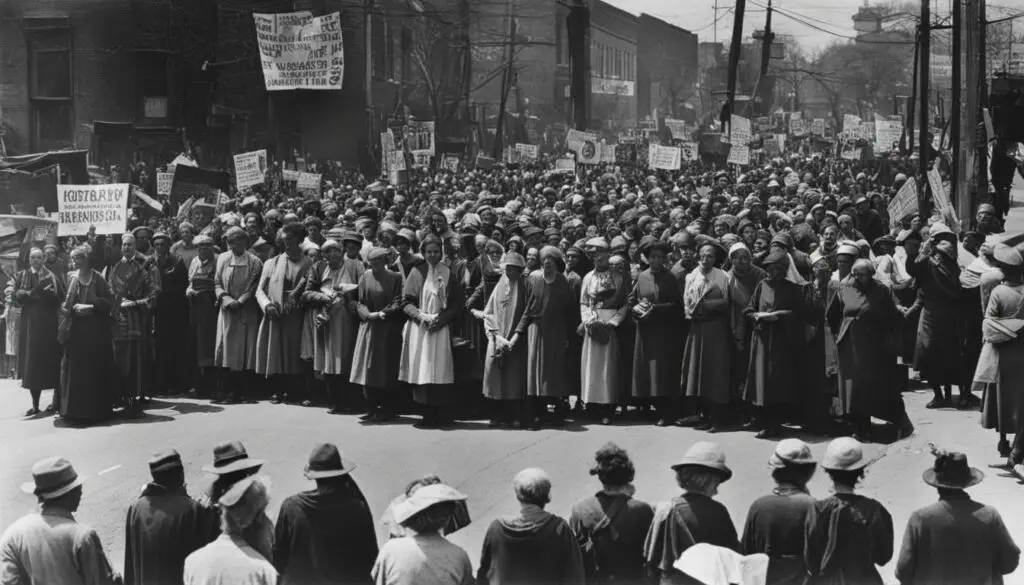Meet Dorothy Day, a remarkable woman whose unwavering commitment to social justice, poverty alleviation, and faith-based activism has left an indelible mark on society. From her early years as a journalist in New York City to her co-founding of the Catholic Worker Movement, Day’s life is a testament to the power of compassion, advocacy, and love in creating a more just and equitable world.
What inspired Dorothy Day’s work was her deep-seated belief in the inherent dignity of every human person, rooted in her Catholic faith. Her encounters with poverty and social inequalities on the streets of New York City propelled her to take action and challenge the status quo.
Day’s key achievements revolve around her tireless efforts to educate the public about social injustices and inspire them to join the fight against poverty. Through her role as the writer and editor of The Catholic Worker newspaper, she exposed the harsh realities faced by the marginalized and advocated for nonviolent resistance.
Overcoming challenges was a constant in Dorothy Day’s life. She faced opposition from both within the Catholic Church and the government, but remained dedicated to her cause. Fundraising for the Catholic Worker Movement and the hospitality houses she established proved to be a continual struggle, yet she persisted, never wavering in her mission to serve the poor.
The impact Dorothy Day had on society cannot be overstated. Her writings and activism raised awareness about social injustices and inspired countless individuals to take action. The Catholic Worker Movement, which she co-founded, continues to thrive today, with hospitality houses around the world offering food, shelter, and support to those in need.
At the core of Dorothy Day’s work were her deep-rooted values and principles. Her Catholic faith provided the foundation for her activism, and she believed in the transformative power of love and compassion. Day embodied the corporal works of mercy, caring for the hungry, the naked, and the homeless.
The legacy Dorothy Day has left behind is one of inspiration and hope. Her example serves as a reminder that one person can make a difference and that small acts of kindness can have a ripple effect. Her autobiography, “The Long Loneliness,” continues to inspire individuals to live lives dedicated to faith-based activism and service to others.
So, what can we learn from Dorothy Day’s life? We can learn that our beliefs and principles should guide our actions, even in the face of adversity. We can learn that each of us has the power to create meaningful change in our communities. And we can learn that by advocating for social justice and alleviating poverty, we can build a more compassionate and inclusive society.
Key Takeaways
- Dorothy Day dedicated her life to social justice, poverty alleviation, and faith-based activism.
- Her work was inspired by her Catholic faith and a belief in the inherent dignity of every human person.
- Day’s key achievements include founding The Catholic Worker newspaper and establishing hospitality houses for the homeless.
- She overcame challenges from within the Catholic Church and the government, remaining steadfast in her mission.
- Dorothy Day’s impact on society is evident through the continued influence of the Catholic Worker Movement and similar initiatives worldwide.
Biography of Dorothy Day
Dorothy Day, born in Brooklyn, New York in 1897, was a woman of unwavering determination and compassion. After working as a journalist in New York City, she witnessed the harsh realities of poverty in the Lower East Side. This firsthand experience ignited a fire within her, propelling her to dedicate her life to addressing social inequalities and uplifting the marginalized.
In 1933, Day co-founded the Catholic Worker Movement, an organization that aimed to assist the poor, educate people about social injustices, and challenge the societal structures that perpetuated poverty. Through the movement, Day sought to combine her faith with social activism, believing that true change could only be achieved through acts of love, compassion, and solidarity.

Key Achievements of Dorothy Day
One of the most notable achievements of Dorothy Day was the establishment of The Catholic Worker newspaper, a publication dedicated to addressing social injustices, advocating for resistance to injustices, and educating the public. Through this newspaper, Day aimed to shed light on the social ills plaguing society and inspire individuals to take action in the pursuit of a more equitable world.
In addition to her work as a writer and editor, Day also played a crucial role in founding hospitality houses as part of the Catholic Worker Movement. These houses provided much-needed food and shelter to the homeless, offering them a place of refuge and support. Day’s commitment to meeting the basic needs of the most vulnerable members of society demonstrated her unwavering dedication to social activism and compassion.
Furthermore, Day actively engaged in nonviolent resistance and civil disobedience to protest against war and advocate for workers’ rights. Her conviction and courage fueled her involvement in anti-war protests and demonstrations, making her a powerful voice for change and justice.

Overall, Dorothy Day’s key achievements include the establishment of The Catholic Worker newspaper, the founding of hospitality houses, and her active participation in nonviolent resistance. Her tireless efforts to expose social injustices, address the needs of the poor, and promote nonviolent forms of protest left a lasting impact on society.
Overcoming Challenges
Dorothy Day faced numerous challenges throughout her life, but her unwavering commitment to serving the poor and advocating for social justice allowed her to overcome them with resilience and determination. Day encountered opposition from some within the Catholic Church and the government, who did not fully embrace her radical approach to addressing poverty. Despite these obstacles, she never wavered in her belief that everyone deserved to live a dignified life.
Another significant challenge was the constant need to fundraise in order to support the Catholic Worker Movement and the hospitality houses it operated. Day relied heavily on donations and often faced financial difficulties. However, she always found ways to persevere, mobilizing her community and leveraging her influence as a prominent activist and writer to secure the necessary resources to continue her work.
Day’s innovative and often controversial approach to poverty alleviation presented its own set of challenges. Her commitment to providing direct aid to the poor through hospitality houses, instead of relying solely on traditional charity models, drew criticism from some who believed it perpetuated dependence. However, Day remained steadfast in her belief that the Catholic Worker Movement’s approach of addressing the underlying systemic issues of poverty was necessary for true social change.

Despite the challenges she faced, Dorothy Day’s unwavering commitment to her mission allowed her to overcome these obstacles and make a lasting impact on society. Her dedication to social justice and poverty alleviation continues to inspire individuals around the world to this day.
Impact on Society
Dorothy Day’s work with the Catholic Worker Movement had a profound impact on society, leaving a lasting legacy in the realms of social justice, poverty alleviation, and faith-based activism. Through her tireless efforts, she raised awareness about social injustices and poverty, targeting both intellectuals and the general public. Day’s influential work inspired the establishment of similar initiatives and hospitality houses around the world, igniting a global movement for change.
At the heart of Day’s impact was The Catholic Worker newspaper, which she used as a platform to expose social ills and educate the public about the plight of the poor. Her engaging and thought-provoking writing challenged the prevailing societal structures that perpetuated poverty, pushing for greater empathy and compassion toward those in need.
The Catholic Worker Movement, under Day’s leadership, not only provided practical assistance to those suffering from poverty but also sparked a broader conversation about social justice and the responsibilities of individuals and institutions in addressing systemic issues. Through this movement, Day inspired countless individuals to take action and make a difference in their communities.

Dorothy Day’s impact on society can be seen in the lasting growth of the Catholic Worker Movement. Today, there are more than 185 hospitality houses operating worldwide, providing assistance to those in need. These hospitality houses embody the principles of social justice and solidarity that Day championed throughout her life.
| Impact Areas | Key Highlights |
|---|---|
| Social Awareness | Day raised awareness about social injustices among intellectuals and the general public through The Catholic Worker newspaper. |
| Global Influence | Day’s efforts inspired the establishment of similar hospitality houses and social justice initiatives around the world. |
| Social Justice Advocacy | The Catholic Worker Movement continues to provide practical assistance to those suffering from poverty, while also advocating for social justice. |
Day’s impact on society transcends borders and time, as her work continues to inspire individuals to engage in social justice and poverty alleviation in their own communities. Her legacy serves as a reminder of the power of passionate activism and the capacity for each individual to make a meaningful difference in the world.
Core Values and Principles
Dorothy Day’s commitment to social justice and faith-based activism was deeply rooted in her Catholic beliefs. She embraced the core value of recognizing the inherent dignity of every human person, regardless of their social status or background. Day’s understanding of social justice was not simply theoretical; she actively put her beliefs into practice by engaging in the corporal works of mercy.
Feeding the hungry, clothing the naked, and sheltering the homeless were tangible ways in which Day demonstrated her commitment to social justice and compassion. She saw these acts not only as acts of charity but also as powerful means for challenging systems that perpetuate poverty and inequality.
“The greatest challenge of the day is: how to bring about a revolution of the heart, a revolution which has to start with each one of us?
When we begin to take the lowest place, to wash the feet of others, to love our brothers with that burning love, that passion, which led to the Cross, then we can truly say, ‘Now I have begun.'”
Day’s advocacy work was driven by her conviction that love and compassion were essential in creating a more just society. She believed that faith and action were inseparable and that true faith necessitated active engagement in the pursuit of justice.
By living out her core values and principles, Dorothy Day not only inspired others to follow in her footsteps but also laid the foundation for the Catholic Worker Movement to become a force for social change.

Dorothy Day’s Core Values and Principles
| Core Values and Principles | Explanation |
|---|---|
| Inherent Dignity | Believed in the value and worth of every person, regardless of background or social status. |
| Corporal Works of Mercy | Practiced acts of compassion, such as feeding the hungry, clothing the naked, and sheltering the homeless, as a means of challenging systemic injustice. |
| Love and Compassion | Advocated for the transformative power of love and compassion in creating a more just society. |
| Faith and Action | Believed that faith necessitated active engagement in the pursuit of justice. |
Legacy of Dorothy Day
Dorothy Day’s legacy is an enduring source of inspiration for individuals committed to social activism and poverty alleviation. Her tireless work within the Catholic Worker Movement has left a profound impact on society. Today, over 185 hospitality houses operating worldwide continue to carry forth Day’s mission of providing shelter, food, and support to those in need.
Day’s writings, including her autobiography “The Long Loneliness,” serve as beacons of hope and guidance for those seeking to live lives dedicated to faith-based activism and service to others. Her work continues to inspire individuals to challenge social injustices, promote compassion, and work towards creating a more equitable and just society.
Lessons from Dorothy Day’s Life
Dorothy Day’s life serves as a powerful reminder of the transformative impact that individuals can have when they live according to their values and principles. Despite facing opposition and challenges, Day’s unwavering commitment to social justice, faith-based activism, and alleviating poverty continues to inspire others to this day.
One of the key lessons we can learn from Dorothy Day is that every person has the potential to make a difference. Through her tireless work and advocacy, Day showed that even small acts of kindness and compassion can create significant change in the lives of individuals and communities. Her example encourages us to step up and actively participate in the fight for social justice, using our voices and actions to uplift and empower the marginalized and oppressed.
Dorothy Day’s life also teaches us the importance of perseverance in the face of challenges. She encountered opposition from various sectors, including some within the Catholic Church and the government. However, Day remained resolute in her mission, tirelessly working to overcome these obstacles and ensure the success of the Catholic Worker Movement and its initiatives to alleviate poverty.
Moreover, Day’s commitment to social justice and faith-based activism reminds us of the values and principles that can guide our own lives. She believed in the inherent dignity of every human person and grounded her actions in love and compassion. By following Day’s example, we can strive to create a society that upholds these values, where everyone has access to the resources and opportunities they need to thrive.
The impact of Dorothy Day’s work extends far beyond her lifetime. Her advocacy efforts and the establishment of the Catholic Worker Movement have inspired countless individuals around the world to dedicate themselves to social justice and poverty alleviation. Today, over 185 hospitality houses operate under the guidance of the movement, providing much-needed support and solidarity to those in need.
As we reflect on the legacy of Dorothy Day, let us not only admire her achievements but also internalize the lessons she has left behind. May we strive to emulate her compassion, resilience, and unwavering commitment to social justice. By doing so, we can continue her work of creating a more just and equitable world for all.
https://www.youtube.com/watch?v=mh8mt3gvDbc
| Lesson from Dorothy Day’s Life | Key Takeaway |
|---|---|
| Living according to values and principles | Individuals can make a difference by aligning their actions with their beliefs and values. |
| Small acts of kindness and compassion | Even small actions can have a significant impact on individuals and communities in need. |
| Perseverance in the face of challenges | Overcoming obstacles is essential for creating lasting change and achieving social justice. |
| Guiding values and principles | Grounding our actions in love, compassion, and the belief in the inherent dignity of every human person is crucial for creating a more just society. |
| Legacy and impact | Dorothy Day’s work continues to inspire individuals and organizations worldwide, driving the fight for social justice and poverty alleviation. |
The Catholic Worker Movement
The Catholic Worker Movement, co-founded by Dorothy Day and Peter Maurin, is an organization devoted to social activism and poverty alleviation. Inspired by their deep faith and commitment to justice, Day and Maurin established the movement in 1933 during the Great Depression.
The Catholic Worker Movement operates hospitality houses across the United States, providing food, shelter, and assistance to those in need. These houses serve as sanctuaries of compassion and solidarity, embodying the movement’s core values and principles.
Central to the Catholic Worker Movement is the belief in nonviolent resistance as a means to protest injustices and effect systemic change. Inspired by the teachings of Jesus, Day envisioned a world where love and compassion would prevail over violence and oppression.
Through their work with the Catholic Worker Movement, Day and Maurin aimed to challenge societal structures that perpetuated poverty, advocate for workers’ rights, and raise awareness about the plight of the poor. They believed in the essential dignity of every human person and sought to create a society that reflected this belief.
Key Achievements of the Catholic Worker Movement
The Catholic Worker Movement has left a profound impact on society through its tireless efforts to alleviate poverty and promote social justice. Some key achievements include:
- Establishing numerous hospitality houses across the United States, providing essential support to those experiencing homelessness and poverty.
- Publishing The Catholic Worker newspaper, which continues to raise awareness about social issues and advocate for positive change.
- Inspiring individuals and communities to take up the cause of social justice, resulting in the establishment of similar organizations and initiatives worldwide.
The Legacy of the Catholic Worker Movement
The Catholic Worker Movement and the vision of Dorothy Day have left a lasting legacy. Their work continues to inspire individuals to live lives devoted to faith-based activism, social justice, and solidarity with the poor. The movement’s hospitality houses remain beacons of hope and compassion in communities across the globe.
Lessons from the Catholic Worker Movement
The Catholic Worker Movement teaches us the power of collective action, grounded in love and compassion, to bring about meaningful change. It reminds us of the importance of standing up for the marginalized and oppressed, even in the face of opposition. The movement’s emphasis on nonviolent resistance and faith-based activism serves as a powerful example for those working to create a more just and equitable society.
| Key Principles of the Catholic Worker Movement | Impact |
|---|---|
| Nonviolent resistance | Inspires peaceful protest and challenges oppressive systems |
| Hospitality houses | Provides shelter, food, and support to the homeless and impoverished |
| Advocacy | Raises awareness about social issues and promotes systemic change |
The Impact of Dorothy Day’s Conversion to Catholicism
Dorothy Day’s conversion to Catholicism had a profound impact on her life and work. It solidified her commitment to social justice and provided a framework for her activism. Embracing the principles and teachings of Catholicism, Day found her faith to be a powerful catalyst for promoting social change and alleviating the suffering of others.
Upon her conversion, Dorothy Day began to embrace the Catholic Church’s teachings on the inherent dignity of every human person. She firmly believed that all individuals, regardless of their background or circumstances, deserved respect, compassion, and access to basic human rights. Day’s Catholic faith inspired her to advocate for the marginalized and oppressed, leading her to found the Catholic Worker Movement and dedicate her life to serving those in need.
Through her faith, Dorothy Day recognized the urgent need to address systemic injustices and work towards a more just and equitable society. She saw her own conversion as an awakening to the call of social justice and viewed it as her duty to embody the teachings of Jesus Christ by actively pursuing a world where poverty, inequality, and exploitation were addressed.
One of the key values that emerged from Dorothy Day’s Catholicism was her unwavering belief in the transformative power of love and compassion. She understood that true social change could only be achieved by recognizing the dignity of every human person and embracing empathy in all interactions. Day’s faith fueled her sense of responsibility to actively seek justice and serve the poor, reminding others that small acts of kindness could make a significant impact in the lives of those in need.
Day’s conversion to Catholicism not only shaped her approach to social justice but also provided the Catholic Worker Movement with a strong moral foundation. Today, the movement continues to be guided by the principles and values that Day held dear, with over 185 hospitality houses worldwide offering food, shelter, and support to those experiencing homelessness and poverty.
Dorothy Day’s conversion to Catholicism set her on a path of faith-based activism and social justice that continues to inspire individuals to this day. Her example reminds us of the power of faith and the profound impact that one person can have in creating a more just and compassionate society.
Dorothy Day’s Pacifism and Nonviolent Resistance
Dorothy Day, a devout member of the Catholic Worker Movement, was known for her unwavering commitment to pacifism and nonviolent resistance. Throughout her life, she actively resisted violence and injustice through peaceful means, firmly believing in the power of love and compassion to create lasting change.
Day’s pacifist stance led her to participate in numerous anti-war protests and demonstrations for workers’ rights. Despite facing multiple arrests and opposition, she courageously stood up for what she believed in, inspiring others with her unwavering dedication.
In her own words, Day once stated, “I really only love God as much as I love the person I love the least.” This quote highlights her core belief in the inherent worth and dignity of every human being, a principle that fueled her commitment to nonviolence and resistance against social injustices.
By embracing nonviolent resistance, Day exemplified the transformative power of peaceful activism. She understood that real change could be achieved through compassion, understanding, and the relentless pursuit of justice. Day’s dedication to nonviolence remains a central pillar of the Catholic Worker Movement and continues to inspire individuals around the world.
Conclusion
Dorothy Day’s life serves as an inspiration for individuals committed to social justice, poverty alleviation, and faith-based activism. Her unwavering dedication to serving the poor and marginalized, alongside her tireless work with the Catholic Worker Movement, continues to resonate today.
What inspired Day’s work was the recognition of the inherent dignity of every human person. She believed that love and compassion were powerful tools in creating a more just and equitable society. Day’s key achievements included the establishment of The Catholic Worker newspaper, which raised awareness about social injustices and advocated for nonviolent resistance. She also founded hospitality houses that provided essential support and care to the homeless.
Day faced numerous challenges, from opposition within the Catholic Church to the difficulties of fundraising. However, she overcame these obstacles with unwavering perseverance, upholding her core values and principles throughout her journey. Her impact on society remains significant, inspiring the establishment of similar initiatives worldwide and elevating the discourse around social justice and poverty alleviation.
Dorothy Day’s legacy is one of inspiration and transformation. Her writings, including the autobiography “The Long Loneliness,” continue to inform individuals inspired to live lives of faith-based activism and service to others. Day’s example teaches us the importance of living our values, even in the face of opposition, and emphasizes that anyone can make a difference in the world. Her life and work serve as a testament to the power of love, compassion, and unwavering commitment to creating a more just and equitable society.
FAQ
Who was Dorothy Day?
Dorothy Day was a social activist, journalist, and pacifist who co-founded the Catholic Worker Movement. She dedicated her life to advocating for social justice, poverty alleviation, and faith-based activism.
What were Dorothy Day’s key achievements?
Dorothy Day’s key achievements include the establishment of The Catholic Worker newspaper, which exposed social injustices and advocated for resistance to injustices. She also founded hospitality houses that provided food and shelter to the homeless.
What challenges did Dorothy Day face?
Dorothy Day faced opposition from some within the Catholic Church and the government. She also had to navigate the difficulties of fundraising to support the Catholic Worker Movement and the hospitality houses.
How did Dorothy Day impact society?
Dorothy Day raised awareness about social injustices and poverty through The Catholic Worker newspaper. Her work inspired the establishment of similar hospitality houses and social justice initiatives around the world.
What were Dorothy Day’s core values and principles?
Dorothy Day’s core values and principles revolved around her Catholic faith and commitment to social justice. She practiced the corporal works of mercy and believed in the inherent dignity of every human person.
What is the legacy of Dorothy Day?
Dorothy Day’s legacy is one of inspiring and challenging others to work for social justice and alleviate poverty. The Catholic Worker Movement she co-founded continues to thrive, and her writings continue to inspire individuals to live lives dedicated to faith-based activism.
What lessons can we learn from Dorothy Day’s life?
Dorothy Day teaches us the importance of living our values and principles, even in the face of opposition and challenges. She demonstrates that one person can make a difference and that small acts of kindness and compassion can have a significant impact on individuals and communities in need.
What is The Catholic Worker Movement?
The Catholic Worker Movement is an organization dedicated to promoting social justice and serving the poor. It operates hospitality houses that provide food, shelter, and support to those in need. The movement emphasizes nonviolent resistance, faith-based activism, and solidarity with the marginalized.
How did Dorothy Day’s conversion to Catholicism impact her life?
Dorothy Day’s conversion to Catholicism solidified her commitment to social justice and provided a framework for her activism. Her Catholic faith informed her belief in the inherent dignity of every human person and the need to address systemic injustices.
What was Dorothy Day’s stance on pacifism and nonviolent resistance?
Dorothy Day was a committed pacifist and advocate for nonviolent resistance. She believed in actively resisting violence and injustice through peaceful means, which led to her participation in anti-war protests and demonstrations for workers’ rights.


Hey there just wanted to give you a brief heads up and let you know a few of the images aren’t loading properly. I’m not sure why but I think its a linking issue. I’ve tried it in two different web browsers and both show the same outcome.